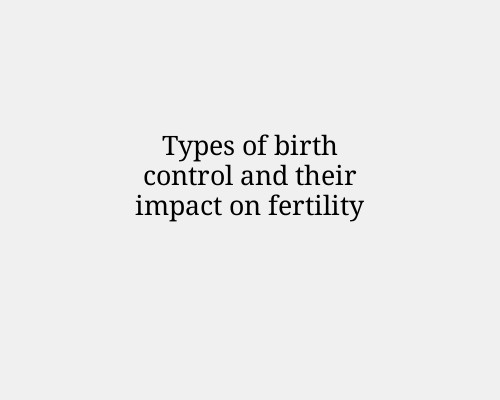
Birth control is a widely used method to prevent pregnancy, but many people have concerns about its long-term impact on fertility. Some worry that hormonal contraception might cause infertility or delay conception after stopping use. However, most forms of birth control do not have a permanent effect on fertility, though some may cause temporary delays in conception. Understanding how different birth control methods influence reproductive health can help individuals make informed decisions.
Hormonal birth control
Hormonal contraceptives prevent pregnancy by regulating ovulation, thickening cervical mucus, or thinning the uterine lining. These include:
birth control pills (Combination and Progestin-Only)
birth control patches
vaginal rings
hormonal injections (Depo-provera)
implants (Nexplanon)
hormonal iuds (Mirena, Kyleena, etc.)
Most hormonal contraceptives do not cause long-term infertility. However, some may temporarily delay the return of ovulation after discontinuation:
pills, patches, and rings: Ovulation typically resumes within one to three months after stopping use.
implants and hormonal iuds: Fertility can return almost immediately after removal.
Injections (Depo-Provera): This method may cause the most prolonged delay in ovulation, with fertility taking up to 6-12 months to return.
non-hormonal birth control
Non-hormonal methods do not interfere with ovulation or hormone levels and have no lasting impact on fertility. These include:
Copper IUD (ParaGard) – Fertility returns immediately after removal.
barrier methods (condoms, diaphragms, cervical caps, and spermicides) – These do not affect ovulation, so fertility is unchanged after discontinuation.
natural family planning (fertility awareness methods) – Since no hormones are involved, fertility remains unaffected.
permanent birth control methods
Some birth control methods are intended to be permanent and can lead to irreversible infertility:
tubal ligation ("getting tubes tied") – Blocks or seals the fallopian tubes, preventing eggs from meeting sperm. Reversal is possible but not always successful.
Vasectomy (for men) – A surgical procedure that prevents sperm from being released. While reversals are possible, they are not always effective.
How long does it take to get pregnant after stopping birth control?
The time it takes to conceive after stopping birth control depends on individual factors, such as age, overall reproductive health, and the method used.
Most hormonal methods: Ovulation resumes within 1-3 months, and many people conceive within a year.
Depo-Provera: It may take up to a year or longer to regain regular cycles.
Copper IUDs and barrier methods: Fertility returns immediately after discontinuation.
Can birth control cause infertility?
Birth control itself does not cause infertility, but other underlying conditions may become apparent after stopping contraception. Some conditions that may affect fertility include:
Polycystic Ovary Syndrome (PCOS) – A hormonal disorder that can cause irregular ovulation.
Endometriosis – Tissue similar to the uterine lining grows outside the uterus, potentially affecting fertility.
age-related fertility decline – If birth control is used for many years, natural age-related decline in fertility may become noticeable.
How to improve fertility after birth control
If you're trying to conceive after stopping birth control, consider the following steps:
track your menstrual cycle: Use apps or ovulation predictor kits to determine when ovulation returns.
maintain a healthy lifestyle: Eat a balanced diet, exercise regularly, and reduce stress.
take prenatal vitamins: Folic acid and other essential nutrients support reproductive health.
consult a doctor: If you don't conceive within a year (or six months if over 35), seek medical advice.
Conclusion
Birth control does not cause permanent infertility, but some methods may delay ovulation for varying lengths of time. Most people regain normal fertility within a few months after stopping contraception. However, factors like age and pre-existing reproductive conditions can also influence fertility. If conception takes longer than expected, a healthcare provider can help assess any underlying issues.